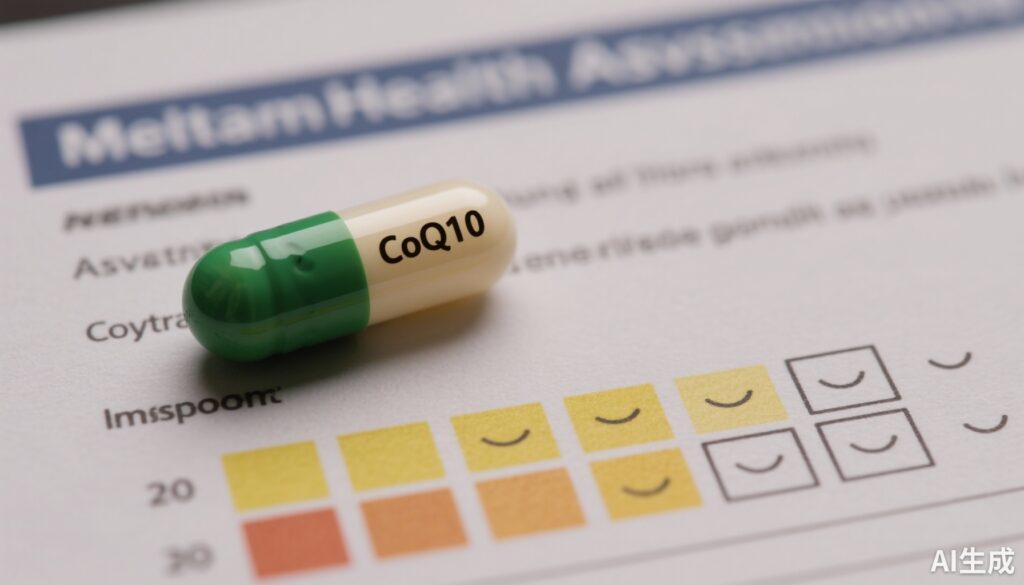Highlight
- Coenzyme Q10 (CoQ10) supplementation shows potential to reduce depressive symptoms at low doses (100-200 mg/day) over short treatment periods (6-8 weeks).
- Significant improvements in depression severity were evident when measured by the Montgomery-Åsberg Depression Rating Scale (MADRS), but not by the Beck Depression Inventory (BDI).
- Effect on anxiety symptoms remains inconclusive due to limited data from small studies showing no significant benefit.
- Further robust randomized controlled trials (RCTs) are warranted to clarify CoQ10’s therapeutic role in mood disorders.
Study Background
Depression and anxiety are pervasive mental health disorders worldwide, representing substantial sources of disability and healthcare burden. Conventional pharmacotherapies, although effective for many, face challenges including adverse effects, treatment resistance, and partial response. Hence, adjunctive or alternative therapies targeting shared pathophysiological pathways such as oxidative stress and inflammation have garnered research interest.
Coenzyme Q10 (CoQ10), a mitochondrial cofactor and robust antioxidant, has been investigated for its neuroprotective and anti-inflammatory properties, which could theoretically modulate mood disorder pathogenesis. Prior studies have yielded heterogeneous results, necessitating comprehensive evaluation of CoQ10’s efficacy in reducing depressive and anxiety symptoms.
Study Design
The systematic review and meta-analysis by Akwan et al. adhered to PRISMA guidelines, encompassing randomized controlled trials (RCTs) examining CoQ10 supplementation versus placebo. The search extended through March 2025 across multiple databases to retrieve relevant data on clinical populations with depression and/or anxiety symptoms.
Primary outcomes included severity measures of depression and anxiety, utilizing validated rating scales such as MADRS, BDI, and others. Standardized mean differences (SMDs) with 95% confidence intervals (CI) were pooled using random-effects models to account for heterogeneity across studies.
Key Findings
The meta-analysis incorporated seven eligible trials totaling approximately 400 patients, six of which were included in pooled quantitative analyses.
Depression Outcomes
- MADRS-based Assessments: Three RCTs involving 158 patients demonstrated a significant reduction in depression severity after 6-8 weeks of CoQ10 supplementation. The pooled SMD was -0.97 (95% CI -1.49 to -0.45), indicating a large effect size favoring CoQ10 over placebo.
- Dose Impact: Analysis of trials using low daily CoQ10 doses (100-200 mg/day) across three studies with 193 patients also showed significant improvement (SMD -0.84, 95% CI -1.54 to -0.14).
- BDI-based Assessments: Conversely, three trials with 146 patients assessed using the Beck Depression Inventory reported no significant difference (SMD -0.12, 95% CI -0.68 to 0.43), suggesting scale-dependent variability.
Anxiety Outcomes
- Only two small trials (101 patients) assessed anxiety symptoms, resulting in a nonsignificant reduction with CoQ10 (SMD -0.28, 95% CI -0.70 to 0.13), highlighting insufficient evidence for anxiolytic effects.
The safety profile of CoQ10 was not extensively reported across studies but is generally considered favorable based on existing literature.
Expert Commentary
The observed moderate-to-large effect on depressive symptoms measured by MADRS but not BDI points to heterogeneous sensitivity among depression scales and possibly distinct patient populations or clinical contexts. The short duration of treatment (6-8 weeks) aligns with clinical timelines for assessing initial antidepressant response but may not capture long-term effectiveness or relapse prevention.
Mechanistically, CoQ10’s antioxidative and mitochondrial support functions may ameliorate neuroinflammation and cellular dysfunction implicated in depression. However, the evidence remains preliminary with limited sample sizes, and potential placebo effects cannot be excluded. Furthermore, the diversity in diagnostic criteria, comorbidities, and concurrent treatments across trials introduces additional variables impacting generalizability.
For anxiety, the lack of sufficient RCTs and inconsistent findings preclude definitive conclusions. Given the complex and heterogeneous nature of anxiety disorders, future investigations should stratify by anxiety subtype and consider mechanistic biomarkers.
Overall, more rigorous large-scale, multicenter RCTs with standardized methodology and longer follow-up durations are essential to confirm CoQ10’s clinical utility in psychiatric populations.
Conclusion
This systematic review and meta-analysis indicate that Coenzyme Q10 supplementation may offer a beneficial effect in reducing depressive symptoms at low doses over short-term treatment periods, particularly when assessed by MADRS. However, evidence for its impact on anxiety remains inconclusive due to limited data. Clinicians and researchers should cautiously interpret these findings and advocate for further comprehensive trials to elucidate CoQ10’s role as adjunctive therapy in mood disorders.
Funding and ClinicalTrials.gov
The study by Akwan et al. did not explicitly detail funding sources or trial registrations within the published report. Future trials should ensure transparent reporting of funding and preregistration to enhance research rigor.
References
Akwan R, Elsharkawy MM, Zrineh A, Amleh A, Douden B, Alhouseini M, Alsaeed L, Eldesouki M. The effect of coenzyme Q10 supplementation on depressive symptoms and anxiety: a systematic review and meta-analysis of randomized controlled trials. Eur J Clin Pharmacol. 2025 Nov;81(11):1555-1568. doi: 10.1007/s00228-025-03904-9.
Additional literature consulted:
— Maes M, Berk M. In depression, oxidative stress and inflammation are intimately linked and may drive disease pathophysiology. Clin Psychopharmacol Neurosci. 2019;17(3):245-257.
— Morris G, Berk M. The many roads to mitochondrial dysfunction in neuroimmune and neuropsychiatric disorders. BMC Med. 2015;13:68.


